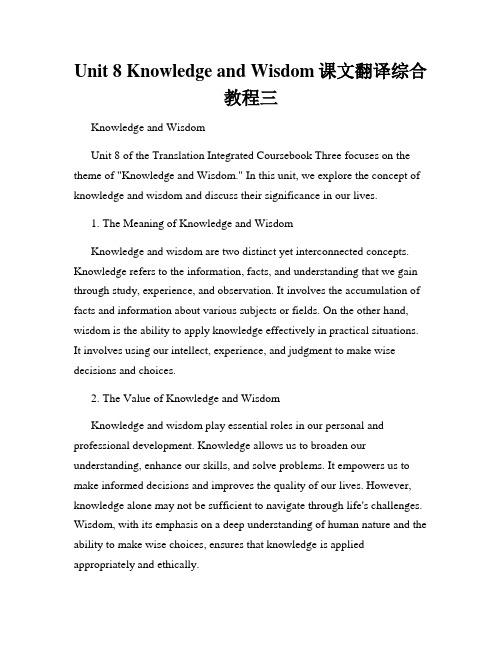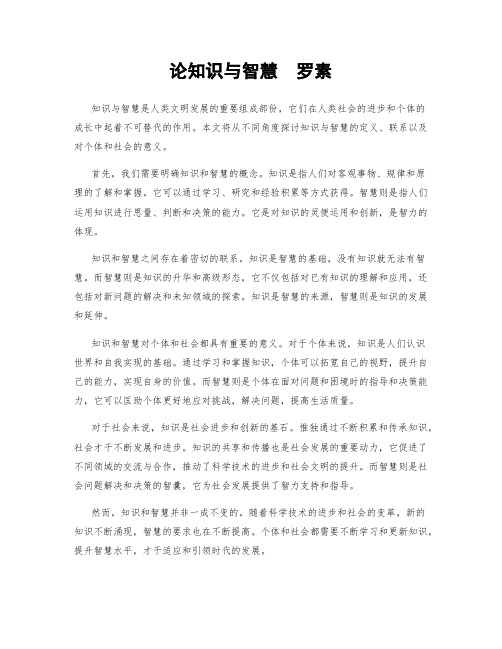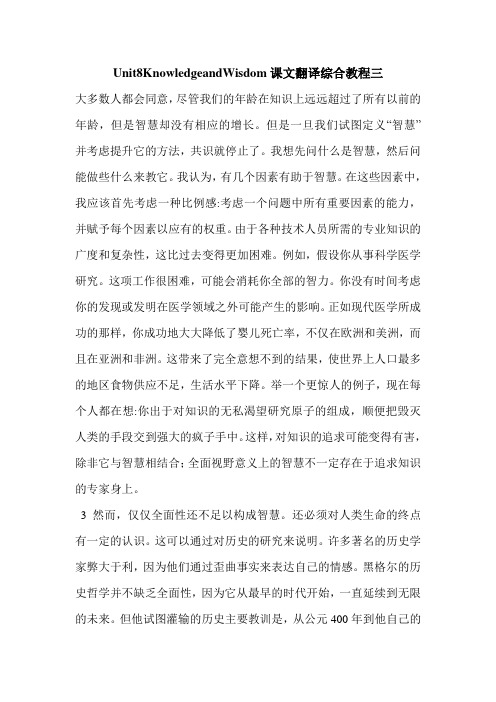论知识与智慧__罗素_knowledge_and_wisdom_译文[1]
Knowledge-and-Wisdom原文及翻译

Knowledge-and-Wisdom原文及翻译Knowledge and wisdom are two distinct concepts。
although they are often used XXX。
experience。
and research。
It is the n of facts。
data。
and n that a person gains over time。
On the other hand。
wisdom is the ability to apply knowledge to make wise ns and judgments。
It involves the use of critical thinking。
good judgment。
and common sense.In today's society。
XXX。
People with knowledge are often XXX。
They are the ones who hold important ns in society and are often well-XXX。
knowledge alone is not enough。
It is important to have wisdom to be able to use that knowledge effectivelyXXX.XXX in life。
they learn to apply their knowledge in a practical way。
They learn from their mistakes and successes。
and develop a sense of what works and what doesn't。
However。
wisdom can also be XXX。
By taking the time to XXX perspectives。
知识与智慧(英语谚语赏析)

Knowledge and Wisdom知识与智慧A good book is a light to the soul.[译]好书一本,照亮心灵。
A good book is the best of friends, the same today and forever.[译]好书如挚友,情谊永不渝。
A good marksman may miss.[译]智者千虑,必有一失。
A little learning is a dangerous thing.[注解]这是18世纪英国著名古典主义诗人亚历山大·薄柏广为流传的诗句。
[译]学问浅薄,如履薄冰。
A man becomes learned by asking questions.[注解]要长学问,就得多问。
[译]不耻下问才能有学问。
A still tongue makes a wise head.[译]智者寡言,寡言为智。
A useful trade is a mine of gold.[译]一技在身犹如金矿在手。
A wise man is strong.[译]智者乃强者。
A word to the wise is enough (or sufficient).[译]聪明人一点就通。
An empty sack cannot stand upright.[注解]袋子里有粮食才能直立,人要吃了饭才能生活;指穷困潦倒常使人丧失一切精神和美德。
汉语中的“空袋立不直”是比喻“没有真才实学就站不稳脚跟”。
[译]空袋子,立不直。
Better sense in the head than cents in the pocket.[译]口袋里有钱,不如头脑里有知识。
Better unborn than untaught.[译]生而不教,不如不生。
Books are ships that pass through the vast sea of time.[译]书籍是时光这一汪洋大海中的航船。
Unit 8 Knowledge and Wisdom课文翻译综合教程三

Unit 8 Knowledge and Wisdom课文翻译综合教程三Knowledge and WisdomUnit 8 of the Translation Integrated Coursebook Three focuses on the theme of "Knowledge and Wisdom." In this unit, we explore the concept of knowledge and wisdom and discuss their significance in our lives.1. The Meaning of Knowledge and WisdomKnowledge and wisdom are two distinct yet interconnected concepts. Knowledge refers to the information, facts, and understanding that we gain through study, experience, and observation. It involves the accumulation of facts and information about various subjects or fields. On the other hand, wisdom is the ability to apply knowledge effectively in practical situations. It involves using our intellect, experience, and judgment to make wise decisions and choices.2. The Value of Knowledge and WisdomKnowledge and wisdom play essential roles in our personal and professional development. Knowledge allows us to broaden our understanding, enhance our skills, and solve problems. It empowers us to make informed decisions and improves the quality of our lives. However, knowledge alone may not be sufficient to navigate through life's challenges. Wisdom, with its emphasis on a deep understanding of human nature and the ability to make wise choices, ensures that knowledge is applied appropriately and ethically.Throughout history, humans have demonstrated a relentless pursuit of knowledge and wisdom. From ancient philosophers to modern scientists, the thirst for knowledge has led to significant discoveries and breakthroughs. This pursuit involves continuous learning, questioning, and seeking new perspectives. It also necessitates critical thinking and the ability to discern accurate information from falsehoods. Wisdom, in contrast, is acquired through experience and reflection. It requires self-awareness, empathy, and an ability to recognize patterns and anticipate outcomes.4. Knowledge and Wisdom in Different FieldsKnowledge and wisdom are applicable in various disciplines and areas of life. In academia, knowledge is acquired through rigorous study and research, while wisdom is developed through critical thinking and application of knowledge. In professions such as medicine and engineering, both knowledge and wisdom are crucial for making informed decisions and solving complex problems. In personal relationships, wisdom helps us navigate emotional dynamics and make sound judgments.5. Cultivating Knowledge and WisdomCultivating knowledge and wisdom is an ongoing process that requires dedication and effort. It starts with a thirst for learning and a commitment to continuous self-improvement. Reading books, attending seminars, and engaging in intellectual discussions can expand our knowledge base. Additionally, wisdom can be developed by reflecting on past experiences, seeking guidance from mentors, and practicing empathy and self-awareness.The acquisition and application of knowledge and wisdom have transformative effects on individuals and societies. Knowledge has driven technological advancements, scientific breakthroughs, and societal progress. It has the potential to improve our standard of living, promote equality, and advance global development. Wisdom, with its emphasis on ethical decision-making, can lead to more harmonious relationships, effective leadership, and sustainable solutions to complex problems.In conclusion, knowledge and wisdom are essential for personal and societal growth. While knowledge provides us with information and understanding, wisdom allows us to apply that knowledge effectively and ethically. The pursuit of knowledge and wisdom is a lifelong endeavor that enriches our lives and contributes to the betterment of society. Let us continue striving for knowledge and cultivating wisdom in our journey towards a more enlightened and fulfilling existence.。
论知识与智慧 罗素

论知识与智慧罗素知识与智慧是人类文明发展的重要组成部份,它们在人类社会的进步和个体的成长中起着不可替代的作用。
本文将从不同角度探讨知识与智慧的定义、联系以及对个体和社会的意义。
首先,我们需要明确知识和智慧的概念。
知识是指人们对客观事物、规律和原理的了解和掌握。
它可以通过学习、研究和经验积累等方式获得。
智慧则是指人们运用知识进行思量、判断和决策的能力。
它是对知识的灵便运用和创新,是智力的体现。
知识和智慧之间存在着密切的联系。
知识是智慧的基础,没有知识就无法有智慧。
而智慧则是知识的升华和高级形态,它不仅包括对已有知识的理解和应用,还包括对新问题的解决和未知领域的探索。
知识是智慧的来源,智慧则是知识的发展和延伸。
知识和智慧对个体和社会都具有重要的意义。
对于个体来说,知识是人们认识世界和自我实现的基础。
通过学习和掌握知识,个体可以拓宽自己的视野,提升自己的能力,实现自身的价值。
而智慧则是个体在面对问题和困境时的指导和决策能力,它可以匡助个体更好地应对挑战,解决问题,提高生活质量。
对于社会来说,知识是社会进步和创新的基石。
惟独通过不断积累和传承知识,社会才干不断发展和进步。
知识的共享和传播也是社会发展的重要动力,它促进了不同领域的交流与合作,推动了科学技术的进步和社会文明的提升。
而智慧则是社会问题解决和决策的智囊,它为社会发展提供了智力支持和指导。
然而,知识和智慧并非一成不变的。
随着科学技术的进步和社会的变革,新的知识不断涌现,智慧的要求也在不断提高。
个体和社会都需要不断学习和更新知识,提升智慧水平,才干适应和引领时代的发展。
总结起来,知识和智慧是相互依存、相互促进的。
它们在个体和社会的发展中起着重要的作用。
个体通过学习和掌握知识,提升自己的能力和价值;智慧则是个体在面对问题和困境时的指导和决策能力。
社会通过知识的积累和共享,推动科学技术的进步和社会的发展;智慧则为社会问题解决和决策提供智力支持和指导。
因此,我们应该重视知识和智慧的培养,不断学习和更新知识,提升智慧水平,为个体和社会的发展做出更大的贡献。
论知识与智慧 罗素

论知识与智慧罗素知识与智慧的关系一直以来都是哲学和教育领域的重要话题。
本文将探讨知识和智慧的定义、区别以及它们在个人和社会发展中的作用。
同时,还将介绍罗素对知识和智慧的看法。
首先,我们来定义知识和智慧。
知识是指人们通过学习、经验或研究所获得的信息和理解。
它可以是事实、概念、原则或技能。
智慧则是对知识的理解和运用的能力。
它不仅仅是对事实和概念的了解,还包括对问题的分析、判断和解决的能力。
智慧是一种综合的能力,它涉及到对知识的整合和应用。
知识和智慧之间的区别在于知识更注重于获取和积累信息,而智慧则更注重于对知识的理解和运用。
知识可以被教授和学习,而智慧则需要通过思考和实践来培养和发展。
知识是智慧的基础,但智慧不仅仅是知识的简单堆砌,它还需要对知识进行整合和创新。
在个人发展中,知识和智慧都起着重要的作用。
知识可以帮助我们了解世界,扩大我们的视野,提供解决问题的方法和工具。
它可以帮助我们取得成功,提高我们的技能和专业知识。
然而,知识并不一定能够带来智慧。
智慧需要我们对知识进行思考和反思,将知识应用到实际生活中,从而获得更深层次的理解和洞察力。
智慧使我们能够更好地应对复杂的问题和挑战,做出明智的决策和选择。
在社会发展中,知识和智慧也起着重要的作用。
知识的积累和传播是社会进步和创新的基础。
它可以帮助我们解决社会问题,改善生活质量,推动科技和文化的发展。
智慧则是社会发展的驱动力。
智慧使我们能够更好地理解社会问题,找到解决问题的方法和策略,推动社会变革和进步。
罗素是20世纪著名的哲学家和数学家,他对知识和智慧的看法也有着独特的贡献。
罗素认为知识是人类进步的基石,但他也指出知识的局限性。
他认为知识不能完全解释世界的本质和意义,它只是我们对现实的一种理解和描述。
罗素强调了智慧的重要性,他认为智慧是对知识的批判性思考和创新性运用。
智慧使我们能够超越传统的观念和偏见,思考更深层次的问题,追求真理和智慧的价值。
总结起来,知识和智慧是紧密相关但又有区别的概念。
Unit8KnowledgeandWisdom课文翻译综合教程三

Unit8KnowledgeandWisdom课文翻译综合教程三大多数人都会同意,尽管我们的年龄在知识上远远超过了所有以前的年龄,但是智慧却没有相应的增长。
但是一旦我们试图定义“智慧”并考虑提升它的方法,共识就停止了。
我想先问什么是智慧,然后问能做些什么来教它。
我认为,有几个因素有助于智慧。
在这些因素中,我应该首先考虑一种比例感:考虑一个问题中所有重要因素的能力,并赋予每个因素以应有的权重。
由于各种技术人员所需的专业知识的广度和复杂性,这比过去变得更加困难。
例如,假设你从事科学医学研究。
这项工作很困难,可能会消耗你全部的智力。
你没有时间考虑你的发现或发明在医学领域之外可能产生的影响。
正如现代医学所成功的那样,你成功地大大降低了婴儿死亡率,不仅在欧洲和美洲,而且在亚洲和非洲。
这带来了完全意想不到的结果,使世界上人口最多的地区食物供应不足,生活水平下降。
举一个更惊人的例子,现在每个人都在想:你出于对知识的无私渴望研究原子的组成,顺便把毁灭人类的手段交到强大的疯子手中。
这样,对知识的追求可能变得有害,除非它与智慧相结合;全面视野意义上的智慧不一定存在于追求知识的专家身上。
3然而,仅仅全面性还不足以构成智慧。
还必须对人类生命的终点有一定的认识。
这可以通过对历史的研究来说明。
许多著名的历史学家弊大于利,因为他们通过歪曲事实来表达自己的情感。
黑格尔的历史哲学并不缺乏全面性,因为它从最早的时代开始,一直延续到无限的未来。
但他试图灌输的历史主要教训是,从公元400年到他自己的时代,德国一直是世界上最重要的国家和进步的旗手。
也许可以把构成9智慧的全面性扩展到不仅包括智力,还包括感觉。
发现知识渊博但感情狭隘的人绝非罕见。
这些人缺乏我所说的智慧。
不仅在公共场合,在私人生活中同样需要智慧。
在选择要追求的目标和从个人偏见中解放出来时,这是需要的。
即使是一个如果可以实现就不值得追求的目标,如果它本来就不可能实现,也可能不明智地追求。
Knowledge-and-Wisdom原文及翻译
Knowledge and Wisdom1. Most people would agree that, although our age far surpasses all previous ages in knowledge, there has been no correlative increase in wisdom. But agreement ceases as soon as we attempt to define "wisdom" and consider means of promoting it. I want to ask first what wisdom is, and then what can be done to teach it.2. There are several factors that contribute to wisdom. Of these I should put first a sense of proportion: the capacity to take account of all the important factors in a problem and to attach to each its due weight. This has become more difficult than it used to be owing to the extent and complexity of the specialized knowledge required of various kinds of technicians. Suppose, for example, that you are engaged in research in scientific medicine. The work is difficult and is likely to absorb the whole of your intellectual energy. You have not time to consider the effect which your discoveries or inventions may have outside the field of medicine. You succeed (let us say), as modern medicine has succeeded, in enormously lowering the infant death-rate, not only in Europe and America, but also in Asia and Africa. This has the entirely unintended result of making the food supply inadequate and lowering the standard of life in the most populous parts of the world. To take an even more spectacular example, which is in everybody's mind at the present time: You study the composition of the atom from a disinterested desire for knowledge, and incidentally place in the hand of powerful lunatics the means of destroying the human race. In such ways the pursuit of knowledge may become harmful unless it is combined with wisdom; and wisdom in the sense of comprehensive vision in not necessarily present in specialists in the pursuit of knowledge.3. Comprehensiveness alone, however, is not enough to constitute wisdom. There must be, also, a certain awareness of the ends of human life. This may be illustrated by the study of history. Many eminent historians have done more harm than good because they viewed facts through the distorting medium of their own passions: Hegel had a philosophy of history which did not suffer from any lack of comprehensiveness, since it started from the earliest times and continued into an indefinite future. But the chief lesson of history which he sought to inculcate was that from the year A. D. 400 down to his own time, Germany had been the most important nation and the standard-bearer of progress in the world. Perhaps one could stretch the comprehensiveness that constitutes wisdom to include not onlyintellect but also feeling. It is by no means uncommon to find men whose knowledge is wide but whose feelings are narrow. Such men lack what I am calling wisdom.4. It is not only in public ways, but in private life equally, that wisdom is needed. It is needed in the choice of ends to be pursued and in emancipation from personal prejudice. Even an end which it would be noble to pursue if it were attainable may be pursued unwisely if it is inherently impossible of achievement. Many men in past ages devoted their lives to search for the Philosopher's Stone and the Elixir of Life. No doubt, if they could have found them, they would have conferred great benefits upon mankind, but as it was, their lives were wasted. To descend to less heroic matters, consider the case of two men, Mr. A and Mr. B, who hate each other and, through mutual hatred, bring each other to destruction. Suppose you go to Mr. A and say, "Why do you hate Mr. B?" he will no doubt give you an appalling list of Mr. B's vices, partly true, partly false. And now suppose you go to Mr. B. he will give you an exactly similar list of Mr. A's vices with an equal admixture of truth and falsehood. Suppose you now come back to Mr. A and say, "You will be surprised to learn that Mr. B says the same things about you as you say about him," and you go to Mr. B and make a similar speech. The first effect, no doubt, will be to increase their mutual hatred, since each will be so horrified by the other's injustice. But, perhaps, if you have sufficient patience and sufficient persuasiveness, you may succeed in convincing each that the other has only the normal share of human wickedness and their enmity is harmful to both. If you do this, you will have instilled some fragment of wisdom.5. I think the essence of wisdom is emancipation, as far as possible, from the tyranny of the here and the now. We cannot help the egoism of our senses. Sight and sound and touch are bound up with our own bodies and cannot be made impersonal. Our emotions start similarly from ourselves. An infant feels hunger and discomfort, and is unaffected except by his own physical condition. Gradually, with the years, his horizon widens, and, in proportion as his thoughts and feelings become less personal and less concerned with his own physical states, he achieves growing wisdom. This is, of course, a matter of degree. No one can view the world with complete impartiality; and if anyone could, he would hardly be able to remain alive. But it is possible to make a continual approach towards impartiality: on the one hand, by knowing things somewhat remote in time or space; and, on the other hand,by giving to such things their due weight in our feelings. It is this approach towards impartiality that constitutes growth in wisdom.6. Can wisdom in this sense be taught? And, if it can, should the teaching of it be one of the aims of education? I should answer both these questions in the affirmative. We are told on Sundays that we should love our neighbour as ourselves. On the other six days of the week, we are exhorted to hate him. You may say that this is nonsense, since it is not our neighbour whom we are exhorted to hate. But you will remember that the precept was exemplified by saying that the Samaritan was our neighbour. We no longer have any wish to hate Samaritans and so we are apt to miss the point of the parable. If you want to get its point, you should substitute "communist" or "anticommunist", as the case may be, for "Samaritan." It might be objected that it is right to hate those who do harm. I do not think so. If you hate them, it is only too likely that you will become equally harmful; and it is very unlikely you will induce them to abandon their evil ways. Hatred of evil is itself a kind of bondage to evil. The way out is through understanding, not through hate. I am not advocating non-resistance. But I am saying that resistance, if it is to be effective in preventing the spread of evil, should be combined with the greatest degree of understanding and the smallest degree of force that is compatible with the survival of the good things that we wish to preserve.7. It is commonly urged that a point of view such as I have been advocating is incompatible with vigour in action. I do not think history bears out this view. Queen Elizabeth I in England and Henry IV in France lived in a world where almost everybody was fanatical, either on the Protestant or on the Catholic side. Both remained free from the errors of their time and both, by remaining free, were beneficent and certainly not ineffective. Abraham Lincoln conducted a great war without ever departing from what I have been calling wisdom.8. I have said that in some degree wisdom can be taught. I think that this teaching should have a larger intellectual element than has been customary in what has been thought of as moral instruction. The disastrous results of hatred and narrow-mindedness to those who fee them can be pointed out incidentally in the course of giving knowledge. I do not think that knowledge and morals ought to be too much separated. It is true that the kind of specialized knowledge which is required for various kinds of skill has little to do with wisdom. But it should be supplemented in education by wider surveys calculated to put it in its place in thetotal of human activities. Even the best technicians should also be good citizens; and when I say "citizens", I mean citizens of the world and not of this or that sect or nation. With every increase of knowledge and skill, wisdom becomes more necessary, for every such increase augments our capacity for realizing our purposes, and therefore augments our capacity for evil, if our purposes are unwise. The world needs wisdom as it has never needed it before; and if knowledge continues to increase, the world will need wisdom in the future even more than it does now.知识与智慧1、我们的时代在知识方面远远超过过去所有时代,在智慧方面却没有得到相应的增加,这是大多数人都会同意的看法。
Unit8KnowledgeandWisdom课文翻译综合教程三
Unit8KnowledgeandWisdom课文翻译综合教程三大多数人都会同意,尽管我们的年龄在知识上远远超过了所有以前的年龄,但是智慧却没有相应的增长。
但是一旦我们试图定义“智慧”并考虑提升它的方法,共识就停止了。
我想先问什么是智慧,然后问能做些什么来教它。
我认为,有几个因素有助于智慧。
在这些因素中,我应该首先考虑一种比例感:考虑一个问题中所有重要因素的能力,并赋予每个因素以应有的权重。
由于各种技术人员所需的专业知识的广度和复杂性,这比过去变得更加困难。
例如,假设你从事科学医学研究。
这项工作很困难,可能会消耗你全部的智力。
你没有时间考虑你的发现或发明在医学领域之外可能产生的影响。
正如现代医学所成功的那样,你成功地大大降低了婴儿死亡率,不仅在欧洲和美洲,而且在亚洲和非洲。
这带来了完全意想不到的结果,使世界上人口最多的地区食物供应不足,生活水平下降。
举一个更惊人的例子,现在每个人都在想:你出于对知识的无私渴望研究原子的组成,顺便把毁灭人类的手段交到强大的疯子手中。
这样,对知识的追求可能变得有害,除非它与智慧相结合;全面视野意义上的智慧不一定存在于追求知识的专家身上。
3然而,仅仅全面性还不足以构成智慧。
还必须对人类生命的终点有一定的认识。
这可以通过对历史的研究来说明。
许多著名的历史学家弊大于利,因为他们通过歪曲事实来表达自己的情感。
黑格尔的历史哲学并不缺乏全面性,因为它从最早的时代开始,一直延续到无限的未来。
但他试图灌输的历史主要教训是,从公元400年到他自己的时代,德国一直是世界上最重要的国家和进步的旗手。
也许可以把构成9智慧的全面性扩展到不仅包括智力,还包括感觉。
发现知识渊博但感情狭隘的人绝非罕见。
这些人缺乏我所说的智慧。
不仅在公共场合,在私人生活中同样需要智慧。
在选择要追求的目标和从个人偏见中解放出来时,这是需要的。
即使是一个如果可以实现就不值得追求的目标,如果它本来就不可能实现,也可能不明智地追求。
论知识与智慧 罗素
论知识与智慧罗素知识与智慧的关系向来以来都是哲学和教育领域的研究重点之一。
罗素是20世纪最重要的哲学家之一,他对知识和智慧的理解有着独特而深刻的见解。
本文将从罗素的观点出发,探讨知识与智慧的含义、区别以及它们对个人和社会的重要性。
首先,我们来看看罗素对知识的定义。
罗素认为,知识是对事物和现象的理性和客观的了解。
它是通过观察、实验、推理和逻辑判断等方法得出的结论。
知识可以分为两种类型:一种是直接经验获得的知识,另一种是通过推理和逻辑判断得出的间接知识。
罗素认为,知识是人类认识世界和改造世界的基础,它是个体和社会发展的重要驱动力。
然而,罗素同时也指出,知识并不等同于智慧。
智慧是对知识的运用和创造性的思量。
它是对问题的深入思量和全面理解,是对知识的灵便运用和创新的能力。
智慧不仅包括理性思维,还包括直觉、洞察力和创造力等能力。
罗素认为,智慧是超越知识的境界,它是人类最高级的认知能力。
知识和智慧之间的区别在于,知识更注重对事物的了解和描述,而智慧更注重对事物的理解和运用。
知识可以被学习和教授,而智慧则需要个体通过思量和实践来培养和发展。
知识可以被积累和传承,而智慧则需要个体不断地思量和创新。
知识是静态的,而智慧是动态的。
那末,知识和智慧对个人和社会的重要性是什么呢?首先,知识是个人和社会发展的基础。
它使个体能够更好地认识世界、理解事物、解决问题。
知识的积累和传承是社会进步和文明发展的基石。
其次,智慧是个体和社会创新和发展的源泉。
智慧使个体能够独立思量、创新思维、解决复杂问题。
智慧的发展和运用推动社会的进步和发展。
在教育方面,知识和智慧的培养都是重要的。
知识的传授和学习是教育的基本任务,它使学生能够获得必要的知识储备和基本技能。
而智慧的培养则需要教育者注重培养学生的思维能力、创新能力和解决问题的能力。
教育应该注重培养学生的批评性思维和创造性思维,使他们能够灵便运用知识,发展自己的智慧。
总结而言,知识和智慧是密切相关但又有区别的概念。
论知识与智慧--罗素-knowledge-and-wisdom-译文
论知识与智慧罗素科学是分门别类的知识;智慧是井井有条的生活。
--伊曼纽尔·康德我们的时代在知识方面远远超过过去所有时代,在智慧方面却没有得到相应的增加,这是大多数人都会同意的看法。
但一旦我试图定义“智慧”并思考增进它的方法,人们就会有不同意见了。
我想问的问题首先是何为智慧,其次是传授智慧的方法。
我想,构成智慧有几种要素,其中须置于首位的是比例感:将问题的所有重要因素都考虑进去并掂量每个因素应有的分量的能力。
鉴于各类技术员所需的专门知识的范围和复杂程度,这种能力变得比过去更难具备。
比如,假设你从事医科,这份工作本身很难做,可能会耗费你的全部智能。
你没有时间去考虑你的发现或发明可能带来的医学领域以外的影响。
你成功了(我们假设),正如现代医学所做到的:婴儿死亡率不仅在欧美而且在亚非也大大降低了。
但完全非你所愿的结果产生了:在世界人口最为稠密的地区,食物供应匮乏,生活水平下降。
再举一个甚至更为引人注目的例子,当前人们都在关注此事:你渴望探求知识,不带功利性地去研究原子结构,却意外地将摧毁人类的手段置于狂人手中。
因此,知识如果不与智慧同在,对知识的追求就能变得有危害性;就全方位来看,追求知识的专家们并不一定具备智慧。
然而,仅有综合能力还不足以构成智慧,还必须加上对人生目的的某种意识。
这一点可以在历史研究中得到说明。
许多杰出的历史学家干的坏事多于好事,因为他们是通过自己的热情这种扭曲性媒介观察事实的。
黑格尔的历史哲学始于亘古,止于无穷未来,也不是不缺乏综合观,但他努力想要说明的历史教义主要是从公元400年到自己的年代,德国一直都是最为重要的民族以及世界进步的标准榜样。
或许构成智慧的综合概念可以延伸,它不仅涵盖智力而且还包括感情。
知识面宽但感觉迟钝的人不是不常见。
这样的人缺少我认为的智慧。
智慧不仅为公共生活所需,也同样为私人生活所需。
选择追求目标,以及从个人偏见中解放出来,都需要智慧。
如果一个目标本身不可能被达到,既便如果它可以被达到的话,追求它的行为一定是高贵的,对这个目标的追求也可能不是明智的,在过去,许多人毕其一生搜寻哲学家的点金石和长生不老药。
- 1、下载文档前请自行甄别文档内容的完整性,平台不提供额外的编辑、内容补充、找答案等附加服务。
- 2、"仅部分预览"的文档,不可在线预览部分如存在完整性等问题,可反馈申请退款(可完整预览的文档不适用该条件!)。
- 3、如文档侵犯您的权益,请联系客服反馈,我们会尽快为您处理(人工客服工作时间:9:00-18:30)。
论知识与智慧罗素
科学是分门别类的知识;智慧是井井有条的生活。
--伊曼纽尔·康德
我们的时代在知识方面远远超过过去所有时代,在智慧方面却没有得到相应的增加,这是大多数人都会同意的看法。
但一旦我试图定义“智慧”并思考增进它的方法,人们就会有不同意见了。
我想问的问题首先是何为智慧,其次是传授智慧的方法。
我想,构成智慧有几种要素,其中须置于首位的是比例感:将问题的所有重要因素都考虑进去并掂量每个因素应有的分量的能力。
鉴于各类技术员所需的专门知识的范围和复杂程度,这种能力变得比过去更难具备。
比如,假设你从事医科,这份工作本身很难做,可能会耗费你的全部智能。
你没有时间去考虑你的发现或发明可能带来的医学领域以外的影响。
你成功了(我们假设),正如现代医学所做到的:婴儿死亡率不仅在欧美而且在亚非也大大降低了。
但完全非你所愿的结果产生了:在世界人口最为稠密的地区,食物供应匮乏,生活水平下降。
再举一个甚至更为引人注目的例子,当前人们都在关注此事:你渴望探求知识,不带功利性地去研究原子结构,却意外地将摧毁人类的手段置于狂人手中。
因此,知识如果不与智慧同在,对知识的追求就能变得有危害性;就全方位来看,追求知识的专家们并不一定具备智慧。
然而,仅有综合能力还不足以构成智慧,还必须加上对人生目的的某种意识。
这一点可以在历史研究中得到说明。
许多杰出的历史学家干的坏事多于好事,因为他们是通过自己的热情这种扭曲性媒介观察事实的。
黑格尔的历史哲学始于亘古,止于无穷未来,也不是不缺乏综合观,但他努力想要说明的历史教义主要是从公元400年到自己的年代,德国一直都是最为重要的民族以及世界进步的标准榜样。
或许构成智慧的综合概念可以延伸,它不仅涵盖智力而且还包括感情。
知识面宽但感觉迟钝的人不是不常见。
这样的人缺少我认为的智慧。
智慧不仅为公共生活所需,也同样为私人生活所需。
选择追求目标,以及从个人偏见中解放出来,都需要智慧。
如果一个目标本身不可能被达到,既便如果它可以被达到的话,追求它的行为一定是高贵的,对这个目标的追求也可能不是明智的,在过去,许多人毕其一生搜寻哲学家的点金石和长生不老药。
毫无疑问,如果他们找到了这些东西,他们就为人类谋取了巨大福祉,但事实上,他们浪费了生命。
退而说不那么伟大的事情,想想两个人,A先生B先生,他们相互憎恨并通过相互憎恨而相互摧毁。
假设你到A先生那里说:“你为什么
不喜欢B先生?”他一定会向你数落一大堆B先生的邪恶,部分真实、部分虚假。
现在,假设你到B先生那里,他会向你数落一大堆A先生的邪恶,内容完全一样,真实和虚假的混合程度也完全一样。
假设你现在回到A先生那里说:“你会很吃惊,要知道,B先生说你的话跟你说B先生的话是一样的,”然后, 你到B先生那里发表同样言论。
毫无疑问,直接的结果就是他们的相互仇恨程度增加,因为他们每人都为对方的偏颇感到震惊,但或许,如果你有足够的耐心和足够的说服力,你会成功说服他们:对方只不过是有人类邪恶的通病,他们的敌意对双方都有损害。
如果你能够这样做,你就向他人灌输了点滴的智慧。
我认为智慧的本质就是逃离此时地的藩篱,越远越好。
我们无法遏制感觉的自我性。
视力、声音和触觉都捆绑在我们自己的身体上,不可能不被私人化。
我们的感情同样始于我们自己。
婴儿感觉饥饿和不舒服,他只受自己身体条件的影响。
渐渐地,随着年龄的增长,他的视野增加,他的思想和感情变得不那么私人性、更少与自己的身体状况相关,他不断获取智慧。
这当然有个程度问题。
没有人对世界的看法能够完全客观;即便有这样的人,他也很难存活。
但不断接近客观是有可能的,办法是:一方面,了解在时空上多少有些遥远的事物;另一方面,让这些事物在我们的感情中占据应有的分量。
就是这种对客观的接近,构成智慧的增加。
这种意义上的智慧可以被传授吗?并且,如果能,传授智慧应当成为教育的目的吗?我对这两个问题的回答是肯定的。
我们在做礼拜的时候被告知要“爱邻如爱己。
”而在一周的其它六天里,我们被劝导去憎恨。
但你要记住,这个箴言的例子是说撒马利亚人是我们的邻居。
我们不再有任何憎恶撒马利来亚人的企图,所以我们有可能领会不到这个寓言的要旨。
如果你想要理解它,你就应该用现在的敌人来替代撒马利亚人,这要视具体情况而定。
可能有人会反对说,人们有权憎恨那些有危害性的人物。
我不这样认为。
如果你憎恨他们,你极有可能变得和他们一样具备危害性;并且你根本没有可能诱导他们放弃自己那种邪恶的方式。
憎恨邪恶本身就是一种对邪恶的依附。
解决办法是理解而不是憎恨。
我不是在倡导不抵抗。
我是在说,抵抗,如果它能有效制止邪恶蔓延,就当与最大程度的理解和最小程度的武力(不破坏我们希望保留的美好事物的生存)相结合。
人们普遍认为,我一直以来所提倡的这种观点与行动产生力量的观点不相容。
我以为,历史证明情况并不如此。
英格兰的伊丽莎白女王一世和法兰西的亨利四世生活在一个几乎人人都疯狂的世界,不论是清教徒还是天主教徒。
二者都超脱于他们时代的错误,并且由于超
脱,二者都行善,而且肯定不是没有效果。
亚伯拉罕·林肯对一场伟大战争的指导,从来没有偏离过我称之为智慧的东西。
我曾说过在某种程度上,智慧可以被传授。
我想这类教育,应当比一直习惯的道德教育具备更大的智力成分。
我想,仇恨和狭隘对持有者的灾难性结果,可以在传授知识的过程中被顺便指出。
我不认为知识和道德应该过分分离。
需要各种技能的专门知识与智慧关系不大,这是事实。
但它可以在教育中被更为广阔的俯瞰所补充,这种俯瞰使它在人类活动的全局中定位。
最好的技术员也应当是好公民;当我说“公民”时,我指的是世界公民。
知识和技能的每一次增长,都使智慧变得更为必要,因为每一次这样的增长,都会扩大我们实现目的的能力。
如果我们的目的不明智,就会扩大我们制造邪恶的能力。
当今世界比过去任何时候都需要智慧;并且,如果知识持续增长,未来世界比当今世界甚至更需要智慧。
